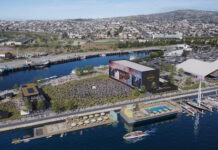
After months of pressure and protests from the government and trade associations, Korea Fair Trade Commission (KFTC) said today (18 January) that it will impose a US$80.7 million fine on 23 liner operators for colluding to fix freight rates on the South Korea-Southeast Asia route over a 15-year period.
The trouble began in July 2018, when the antitrust body received complaints from timber importers, who became suspicious when almost all liner operators simultaneously raised freight charges for the South Korea-Southeast Asia route.
The liner operators include HMM, SM Merchant Marine (SM Line), Korea Marine Transport Company (KMTC Line), Pan Ocean, Sinokor Merchant Marine, Maersk Sealand, COSCO, SITC Container Lines, Evergreen Marine Corporation, Yang Ming Marine Transport and Wan Hai Lines.
KMTC Line will be fined the most, at US$24.86 million, while HMM’s penalty is around US$3 million.
In May 2021, KFTC informed the liner operators that it may impose a total fine of around US$672 million, sparking an outcry from the Ministry of Oceans and Fisheries, Korea Shipowners’ Association, Korea Shipping Association and the Federation of Korean Seafarers’ Unions, who feared that the massive financial penalty could set back the recovery in the shipping industry.
On 5 October 2021, South Korea’s parliament, the National Assembly, passed an amendment to the Shipping Act, stating that the Ministry of Oceans and Fisheries is authorised to regulate shipping companies’ joint actions, which would not be subjected to the Fair Trade Act. Even then, KFTC chief Joh Sung-wook said that it was unlikely that the amendment could be retroactively applied.
The matter was discussed again at a plenary session on 12 January and KFTC said a final decision would be made within the month.
While the liner operators claimed that South Korea’s Shipping Act permits collective actions on freight rates, Joh noted their acts were “illegal” as they failed to meet certain criteria that are permissible under the law.
“In deciding the level of fines, the regulator fully took account the nature of the shipping industry,” Joh said in a media briefing.
Martina Li
Asia Correspondent




